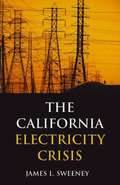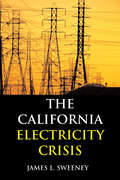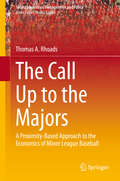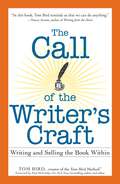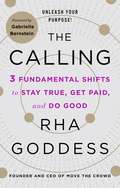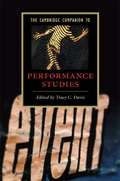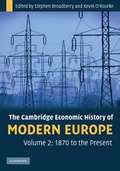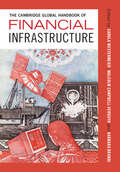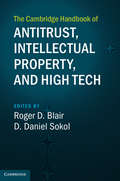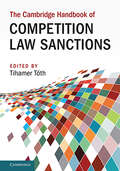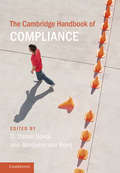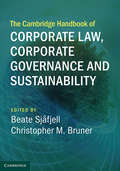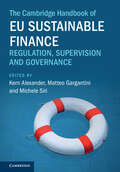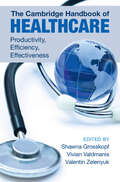- Table View
- List View
The Calculus of Retirement Income
by Moshe A. MilevskyThis 2006 book introduces and develops the basic actuarial models and underlying pricing of life-contingent pension annuities and life insurance from a unique financial perspective. The ideas and techniques are then applied to the real-world problem of generating sustainable retirement income towards the end of the human life-cycle. The role of lifetime income, longevity insurance, and systematic withdrawal plans are investigated in a parsimonious framework. The underlying technology and terminology of the book are based on continuous-time financial economics by merging analytic laws of mortality with the dynamics of equity markets and interest rates. Nonetheless, the book requires a minimal background in mathematics and emphasizes applications and examples more than proofs and theorems. It can serve as an ideal textbook for an applied course on wealth management and retirement planning in addition to being a reference for quantitatively-inclined financial planners.
The California Electricity Crisis
by James L. SweeneySweeney addresses four main topics: the current situation in California, the history of California's energy, the consequences of decisions that are being made, and what we should or shouldn't do about it.
The California Electricity Crisis
by James L. SweeneyAfter political leaders mismanaged the electricity crisis, California now faces an electricity blight while it struggles to recover from its self-imposed wounds. The California Electricity Crisis focuses on policy decisions, their consequences, and alternatives: the saga California has faced and is still facing.
The California Landlord's Law Book: Evictions
by Nils RosenquestYour step-by-step guide to evicting a problem tenant in California Sooner or later, nearly every residential landlord has to evict a tenant for nonpayment of rent, property damage, an illegal sublet (including Airbnb), or another violation of the lease or the law. You don’t always need to hire a lawyer, but you do need reliable information, particularly if your property is under rent control. Here, you’ll find all of the downloadable forms you need along with clear, step-by-step instructions on how to: prepare nonpayment of rent notices, prepare 3-, 30-, 60-, and 90-day notices, complete and serve all required eviction forms deal with tenants’ delaying tactics, and file your “unlawful detainer” complaint in court. <p><p>Just filing an eviction lawsuit often prompts the tenant to leave. If it doesn’t, you’ll learn how to: handle a contested eviction suit by yourself—and know when to get professional help, respond to a tenant’s defenses and claims, evict a tenant who has filed for bankruptcy or is occupying property you purchased at a foreclosure sale understand your options for collecting “Covid rent,” and collect unpaid rent after you win.
The Call Up to the Majors
by Thomas A. RhoadsThis book explores the unique relationships between professional baseball teams and the unique ways professional baseball leagues are organized in North America with a primary focus on how proximity can and does impact consumer demand. Perhaps more than any other matter that arises in the business of baseball, proximity to other professional baseball teams is a concern that has uniquely shaped professional baseball leagues in North America. It is this particular component in how professional baseball leagues are organized that suggests building a proximity-based approach to studying the economics of minor league baseball. This book opens up new ways to study minor league baseball, specifically, and sports leagues more generally. So even as advanced technology has eliminated some of the need for fans to be in close proximity to the teams they love to follow, there is still a need to understand more completely how proximity matters can impact the way professional baseball leagues are structured and how that structure can ultimately impact the quality of the games that entertain sports fans everywhere. This book will be of interest to both sports economists and practitioners.
The Call of the Writer's Craft: Writing and Selling the Book Within
by Tom BirdGetting a book successfully published is as much about talent and creative drive as it is a matter of determination and business practice. Luckily for would-be authors, this book delivers the how-to on both the creativity and the business.Lecturer and writing retreat leader Tom Bird introduces authors to their Divine Author Within, and guides them through the process of listening to this inner muse. They will learn how to tap into their "creative connected mind" and relax their "logical critical mind" so they will be able to write the book they've always wanted to--in just two drafts!Once the book is complete, writers learn how to sell their book. Bird instructs his readers how to successfully navigate the publishing world so that they can make the right choices for their work.
The Calling: 3 Fundamental Shifts to Stay True, Get Paid, and Do Good
by Rha GoddessA game-changing book offering a six-step approach on how to find and follow your true calling and redefine success from entrepeneur and soul coach Rha Goddess.Are you willing to believe in you?Every single one of us has a calling.For most it’s the thing you have to force yourself not to do.When you try to ignore it, you can’t stop thinking about. It is the thing that both terrifies you and brings you the most joy. Already living yours? Great! How do you make the most of it? The Calling will provide readers with a road map, via 3 fundamental shifts, on how to stay true, get paid and do good. The steps that will help lead you there include: RECOGNIZING—it always begins with awareness. If you can’t see it then you can’t do anything about it.ACCEPTING—means embracing, and taking responsibility for yourself, your life, and the things that want or need to be changed.FORGIVING—yourself and others.AND MORE!The Calling will be the resource that people have been asking Rha to write for years, and there has never been a better time for her to share her proven method.
The Cambridge Companion to Adam Smith
by Knud HaakonssenAdam Smith is best known as the founder of scientific economics and as an early proponent of the modern market economy. Political economy, however, was only one part of Smith's comprehensive intellectual system. Consisting of a theory of mind and its functions in language, arts, science, and social intercourse, Smith's system was a towering contribution to the Scottish Enlightenment. His ideas on social intercourse also served as the basis for a moral theory that provided both historical and theoretical accounts of law, politics, and economics. This Companion volume provides an examination of all aspects of Smith's thought. Collectively, the essays take into account Smith's multiple contexts - Scottish, British, European, Atlantic; biographical, institutional, political, philosophical - and they draw on all of his works, including student notes from his lectures. Pluralistic in approach, the volume provides a contextualist history of Smith, as well as direct philosophical engagement with his ideas.
The Cambridge Companion to Hayek
by Edward FeserF. A. Hayek (1899-1992) was among the most important economists and political philosophers of the twentieth century. He is widely regarded as the principal intellectual force behind the triumph of global capitalism, an 'anti-Marx' who did more than any other recent thinker to elucidate the theoretical foundations of the free market economy. His account of the role played by market prices in transmitting economic knowledge constituted a devastating critique of the socialist ideal of central economic planning, and his famous book The Road to Serfdom was a prophetic statement of the dangers which socialism posed to a free and open society. He also made significant contributions to fields as diverse as the philosophy of law, the theory of complex systems, and cognitive science. The essays in this volume, by an international team of contributors, provide a critical introduction to all aspects of Hayek's thought.
The Cambridge Companion to Keynes
by Roger E. Backhouse Bradley W. BatemanJohn Maynard Keynes (1883-1946) was the most important economist of the twentieth century. He was also a philosopher who wrote on ethics and the theory of probability and was a central figure in the Bloomsbury Group of writers and artists. In this volume contributors from a wide range of disciplines offer new interpretations of Keynes's thought, explain the links between Keynes's philosophy and his economics, and place his work and Keynesianism - the economic theory, the principles of economic policy, and the political philosophy - in their historical context. Chapter topics include Keynes's philosophical engagement with G. E. Moore and Franz Brentano, his correspondence, the role of his General Theory in the creation of modern macroeconomics, and the many meanings of Keynesianism. New readers will find this the most convenient, accessible guide to Keynes currently available. Advanced students and specialists will find a conspectus of recent developments in the interpretation of Keynes.
The Cambridge Companion to Performance Studies
by Tracy C. DavisSince the turn of the century, Performance Studies has emerged as an increasingly vibrant discipline. Its concerns - embodiment, ethical research and social change - are held in common with many other fields, however a unique combination of methods and applications is used in exploration of the discipline. Bridging live art practices - theatre, performance art and dance - with technological media, and social sciences with humanities, it is truly hybrid and experimental in its techniques. This 2008 Companion brings together specially commissioned essays from leading scholars who reflect on their own experiences in Performance Studies and the possibilities this offers to representations of identity, self-and-other, and communities. Theories which have been absorbed into the field are applied to compelling topics in current academic, artistic and community settings. The collection is designed to reflect the diversity of outlooks and provide a guide for students as well as scholars seeking a perspective on research trends.
The Cambridge Economic History of Australia
by Simon Ville Glenn WithersAustralia's economic history is the story of the transformation of an indigenous economy and a small convict settlement into a nation of nearly 23 million people with advanced economic, social and political structures. It is a history of vast lands with rich, exploitable resources, of adversity in war, and of prosperity and nation building. It is also a history of human behaviour and the institutions created to harness and govern human endeavour. This account provides a systematic and comprehensive treatment of the nation's economic foundations, growth, resilience and future, in an engaging, contemporary narrative. It examines key themes such as the centrality of land and its usage, the role of migrant human capital, the tension between development and the environment, and Australia's interaction with the international economy. Written by a team of eminent economic historians, The Cambridge Economic History of Australia is the definitive study of Australia's economic past and present.
The Cambridge Economic History of Modern Britain
by Paul Johnson Jane Humphries Roderick Floud Roderick Floud Jane HumphriesThe Cambridge Economic History of Modern Britain is a comprehensive account of the economic history of Britain since 1700, based on the most up-to-date research. Roderick Floud and Paul Johnson have assembled well-known international scholars to produce a set of volumes which serve as a textbook for undergraduate students as well as an authoritative reference guide to the subject.
The Cambridge Economic History of Modern Britain
by Paul Johnson Jane Humphries Roderick Floud Roderick Floud Jane HumphriesThe Cambridge Economic History of Modern Britain is a comprehensive account of the economic history of Britain since 1700, based on the most up-to-date research. Roderick Floud and Paul Johnson have assembled well-known international scholars to produce a set of volumes which serve as a textbook for undergraduate students as well as an authoritative reference guide to the subject.
The Cambridge Economic History of Modern Britain
by Paul Johnson Roderick FloudThe Cambridge Economic History of Modern Britain is a comprehensive account of the economic history of Britain since 1700, based on the most up-to-date research. Roderick Floud and Paul Johnson have assembled well-known international scholars to produce a set of volumes which serve as a textbook for undergraduate students as well as an authoritative reference guide to the subject.
The Cambridge Economic History of Modern Europe, Volume 2: 1870 to the Present
by Kevin H. O'Rourke Stephen BroadberryUnlike most existing textbooks on the economic history of modern Europe, which offer a country-by-country approach, The Cambridge Economic History of Modern Europe rethinks Europe's economic history since 1700 as unified and pan-European, with the material organized by topic rather than by country. This second volume tracks Europe's economic history through three major phases since 1870. The first phase was an age of globalization and of European economic and political dominance that lasted until the First World War. The second, from 1914 to 1945, was one of war, deglobalization, and depression and the third was one of growing integration not only within Europe but also between Europe and the global economy. Leading authors offer comprehensive and accessible introductions to these patterns of globalization and deglobalization as well as to key themes in modern economic history such as economic growth, business cycles, sectoral developments, and population and living standards.
The Cambridge Global Handbook of Financial Infrastructure
by Malcolm Campbell-Verduyn Barbara Brandl Carola WestermeierFinancial infrastructures are the lifeblood of political economies and are consistently considered critical by governments. They encapsulate socio-technical processes; not merely cables and computer servers, but the relationship of those in finance to these and other physical objects. The Cambridge Global Handbook of Financial Infrastructure consolidates the study of financial infrastructures by bridging political economy, humanities, sociology and science and technology studies. It delves into the core questions of modern finance, from the effect of digitalization on financial functions to the intricate web of global power dynamics. Drawing together interdisciplinary research, it explores the nuances of inclusivity and exclusivity within financial systems, shedding light on historical inequalities and colonial legacies. Including fresh insights, compelling case studies, and conceptual advances, this essential volume offers invaluable perspectives for informing analysis of the past, present, future of finance, and shaping policy debates. This title is also available as Open Access on Cambridge Core.
The Cambridge Handbook of Antitrust, Intellectual Property, and High Tech
by Blair Sokol D. Daniel Roger D.This Cambridge Handbook, edited by Roger D. Blair and D. Daniel Sokol, brings together a group of world-renowned professors in the fields of law and economics to assess the theory and practice of antitrust, intellectual property, and high tech. With the increased globalization of antitrust, a better understanding of how law and economics shape this interface will help academics, policymakers, and practitioners to understand the existing state of academic literature, its limits, and its relevance to real-world antitrust. The book will be an essential resource for anyone seeking to understand academic and policy considerations shaping the world of antitrust, intellectual property, and high tech.
The Cambridge Handbook of Competition Law Sanctions (Cambridge Law Handbooks)
by Tihamer TóthThis handbook brings together an international roster of competition law scholars and practitioners to address the issue of sanctions in competition law from all angles. Covering nineteen jurisdictions around the world, the book analyzes the theoretical foundations and practice of sanctioning competition law infringements and, most importantly, cartels. Contributors include a range of experts drawing on criminal law, company law, labor law, human rights, and law and economics, to determine what sanctions are available as a matter of positive law against corporations and individuals, including fines and other criminal, administrative, and civil law sanctions; whether law enforcers are using these sanctions effectively; and if new sanctions – including individual sanctions – should be introduced.
The Cambridge Handbook of Compliance (Cambridge Law Handbooks)
by D. Daniel Sokol Benjamin Van RooijCompliance has become key to our contemporary markets, societies, and modes of governance across a variety of public and private domains. While this has stimulated a rich body of empirical and practical expertise on compliance, thus far, there has been no comprehensive understanding of what compliance is or how it influences various fields and sectors. The academic knowledge of compliance has remained siloed along different disciplinary domains, regulatory and legal spheres, and mechanisms and interventions. This handbook bridges these divides to provide the first one-stop overview of what compliance is, how we can best study it, and the core mechanisms that shape it. Written by leading experts, chapters offer perspectives from across law, regulatory studies, management science, criminology, economics, sociology, and psychology. This volume is the definitive and comprehensive account of compliance.
The Cambridge Handbook of Consumer Privacy
by Evan Selinger Jules Polonetsky Omer TeneBusinesses are rushing to collect personal data to fuel surging demand. Data enthusiasts claim personal information that's obtained from the commercial internet, including mobile platforms, social networks, cloud computing, and connected devices, will unlock path-breaking innovation, including advanced data security. By contrast, regulators and activists contend that corporate data practices too often disempower consumers by creating privacy harms and related problems. <P><P>As the Internet of Things matures and facial recognition, predictive analytics, big data, and wearable tracking grow in power, scale, and scope, a controversial ecosystem will exacerbate the acrimony over commercial data capture and analysis. The only productive way forward is to get a grip on the key problems right now and change the conversation. <P>That's exactly what Jules Polonetsky, Omer Tene, and Evan Selinger do. They bring together diverse views from leading academics, business leaders, and policymakers to discuss the opportunities and challenges of the new data economy.<P> Proposes a new view of the consumer privacy debates.<P> Provides an interdisciplinary account of consumer privacy issues that includes contributions from industry leaders, activists, and policymakers.<P> Offers new pathways forward to move us beyond the current consumer privacy impasses.<P>
The Cambridge Handbook of Consumer Psychology
by Michael I. Norton Derek D. Rucker Norton, Michael I. and Rucker, Derek D. and Lamberton, Cait Cait LambertonWhy do consumers make the purchases they do, and which ones make them truly happy? Why are consumers willing to spend huge sums of money to appear high status? This handbook addresses these key questions and many more. It provides a comprehensive overview of consumer psychology, examining cutting-edge research at the individual, interpersonal, and societal levels. Leading scholars summarize past and current findings and consider future lines of inquiry to deepen our understanding of the psychology behind consumers' decision making, their interactions with other consumers, and the effects of societal factors on consumption. The Cambridge Handbook of Consumer Psychology will act as a valuable guide for faculty as well as graduate and undergraduate students in psychology, marketing, management, sociology, and anthropology.
The Cambridge Handbook of Corporate Law, Corporate Governance and Sustainability (Cambridge Law Handbooks)
by Christopher M. Bruner Beate SjåfjellThe emerging field of corporate law, corporate governance and sustainability is one of the most dynamic and significant areas of law and policy in light of the convergence of environmental, social and economic crises that we face as a global society. Understanding the impact of the corporation on society and realizing its potential for contributing to sustainability is vital for the future of humanity. This Handbook comprehensively assesses the state-of-the-art in this field through in-depth discussion of sustainability-related problems, numerous case studies on regulatory responses implemented by jurisdictions around the world, and analyses of predominant strategies and potential drivers of change. This Handbook will be an essential reference for scholars, students, practitioners, policymakers, and general readers interested in how corporate law and governance have exacerbated global society's most pressing challenges, and how reforms to these fields can help us resolve those challenges and achieve sustainability.
The Cambridge Handbook of EU Sustainable Finance: Regulation, Supervision and Governance (Cambridge Law Handbooks)
by Kern Alexander Michele Siri Matteo GargantiniThis essential reference work explores the role of finance in delivering sustainability within and outside the European Union. With sustainability affecting core elements of company, banking and capital markets law, this handbook investigates the latest regulatory strategies for protecting the environment, delivering a fairer society and improving governance. Each chapter is written by a leading scholar who provides a solid theoretical approach to the topic while focussing on recent developments. Looking beyond the European Union, the book also covers relevant developments in the United States, the United Kingdom and other major jurisdictions. Thorough and comprehensive, this volume is a crucial resource for scholars, policymakers and practitioners who aim for a greener world, a more equitable society and better-managed corporations.
The Cambridge Handbook of Healthcare: Productivity, Efficiency, Effectiveness
by Shawna Grosskopf Vivian Valdmanis Valentin ZelenyukHealthcare is inextricably bound to productivity, efficiency, and economic development. Although many methods for analyzing productivity and efficiency have been extensively covered, relatively little focus has been placed on how those methods can be applied to health care in a coherent and comprehensive manner. The Cambridge Handbook of Healthcare outlines current foundations and states of the art on which future research can build. It brings together experts in this growing field to cover three key sources and aspects of human welfare – productivity, efficiency, and healthcare. Beginning with academic focused chapters, this book bridges and provides outreach to the practice and regulation of the health care industry and includes academic and regulatory perspectives, including overviews of major evidence from international empirical applications. Each chapter is dedicated to a particular topic and delivered by international experts on that topic.

